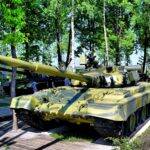The Russian president routinely asserts the ‘special military operation’ is ‘going according to plan.’ To Western ears, the declaration is ridiculous. But Putin is not addressing Westerners. He is addressing Russians for whom the phrase ‘the plan’ holds particular resonance. Pulitzer-prize-winning journalist Hedrick Smith who worked in Moscow for The New York Times in the 1970s, described it in this way: ‘The Plan comes close to being the fundamental law of the land. ‘Fulfil the Plan’ is one of the most incessant incantations of Soviet life. Publicly, the Plan is treated with almost mystical veneration, as if endowed with some superhuman faculty for raising mortal endeavour to a higher plain, freed from human foibles.’1
More prosaically, ‘the plan’ is a bargain between an autocratic ruler and subject people. You will be arrested in Russia if you stand on a street and hold a blank piece of paper above your head. But the compensation for living in an open-air prison is the Kremlin has a plan for you. And, of course, everything is going according to plan.
This article reviews one aspect of ‘the plan’, or more properly, its absence and the Kremlin’s gross miscalculation over the West’s resolve to impose the most severe sanctions in history on an aggressor state.
Was ‘the plan’ to impoverish Russia?
Russian boasts that sanctions are not working – occasionally amplified by Western reporting – bypass two critical factors. First, sanctions were always going to be incremental (the EU has just passed its 11th round of sanctions). And second, sanctions take time to take effect. Only now, with the passing of the first anniversary of the war, we are beginning to see the acid of sanctions corroding the Russian economy. Few sectors have not been hurt. The snapshot below is illustrative but makes the point.
- Banking. In 2022, Sberbank, Russia’s biggest bank, posted an 80% drop in net profit (270.5 billion roubles ($3.56 billion), a 78.3% decrease compared to 2021).
- Central Bank reserves. In the run-up to the war, the Central Bank of Russia built up reserves of over $600 billion (although Governor Elvira Nabiullina had no idea what the Russian president was about to do). Around £300 billion is frozen. For the first time in March 2023, the Bank disclosed a decline of $42.89 billion in its reserves or 14% of available funds. Total reserves, including frozen moneys now total $574.2 billion.
- The National Welfare Fund (NWF). The Russian Federation set up a NWF primarily funded by hydrocarbon taxes to finance ‘national projects’ – not to pay for wars. Independent Russian financial analysis estimates the NWF in 2022 stood at 8.8 trillion roubles. In a soft baseline scenario it is expected to decline by 28.5% by the end of 2023 to 6.3 trillion roubles.
- The budget deficit. According to Ministry of Finance data, the federal budget in January 2023 was executed with a deficit of 1.76 trillion roubles, or 14 times more than in early 2022. This is a 25-year record low. Overall, the budget deficit in the first month of the year exceeded 60% of the annual plan (2.9 trillion roubles). A budget deficit of 5 trillion roubles is no longer viewed as far-fetched (Russia has been a country that consistently posted budget surpluses year-on-year thanks to its hydrocarbon industries).
- The oligarchs. Bloomberg estimates Russia’s billionaires have lost $67 billion. This is Russia’s most significant sudden loss of personal wealth since the 1917 Revolution and subsequent civil war. Russian nationalists crow over impounded yachts and villas in the south of France. Still, they are shooting their barbs at enterprising individuals – notwithstanding the circumstances surrounding the 1990s loans-for-shares scheme that created Russia’s oligarchs – who lifted Russia out of a stale, grim Soviet past. Russia needs more, not fewer, billionaires.
- Automobile industry. Car production in Russia fell by 67% in 2022. Spending on new cars fell by 52% to 1.5 trillion roubles ($20.4 billion). Truck production fell by 24.3%, tractors by 52.6%, and buses by 38.2%. 75% of all cars sold last year were used cars. Sellers exploited the market by raising prices. The biggest beneficiaries, however, have been Chinese car makers. Before the war, Chinese firms accounted for 3% of the Russian market. Today they account for roughly one-third. Chinese car makers have also exploited the market and raised prices.
- Defence industry. The war has paradoxically been a disaster for Russia’s defence firms and proved a bonanza for Western firms. US defence sales jumped a startling 49% in 2022. Putin has made America’s defence giants fabulously profitable. German defence industry is also enjoying a bonanza (and indeed a delegation of Rheinmetall AG headed by the chairman recently travelled to Kyiv for a meeting with President Zelensky). Further afield, South Korean defence firms are another beneficiary of the Kremlin’s blunder, and a story to watch in the future. In contrast, Russian state-owned arms exporter JSC Rosoboronexport admitted in August that defence export revenue was expected to fall by about 26% in 2022.
- Oil and gas. Russian oil and gas revenues fell to a historic low in February. According to Ministry of Finance data, the treasury received 521 billion roubles in oil and gas taxes – 46% less than in February 2022. In 2022, Russian gas exports fell by 46% to 100.9 billion cubic meters, mainly due to reduced supplies to Europe. Gazprom previously held about a third of the market, selling about 80% of exports to its western neighbours. In a snub, China did not sign a Power of Siberia-2 deal during the recent visit of the Chinese president to Moscow. Russian expectations that China will replace the lost European market are misplaced and unlikely to be realised. India won’t save Russia, either. Oil imports from Russia have surged by 2,200%, but Indian buyers are demanding discounted prices.
- Loss of the European market. Before the invasion, Europe was Russia’s biggest trading partner. By December 2022, according to European statistics, exports to Russia fell to €4.3 billion and imports to €10.3 billion. For context, Russia’s pre-war trade in 2021 with the EU accounted for 36 per cent of the total Russian trade turnover or $292 billion.
What sanctions do and don’t achieve
In October 1982, the CIA’s Director of Soviet Analysis received a 143-page classified study on the effects of sanctions.2 The Soviet occupation of Afghanistan was now in its third year, and Moscow was living under Western sanctions. The summary read:
‘A detailed analysis of 13 applications of economic sanctions yields mixed results regarding their effectiveness as instruments of foreign policy. In none of the cases did the imposition of foreign sanctions force a country to reverse the actions that triggered the sanctions. There are two main reasons for this failure:
a. Most economies have sufficient flexibility to mitigate the economic impact of sanctions by circumventing them or by making internal economic adjustments.
b. Even when the sanctions have substantial economic impact, countries have shown a strong and lasting commitment to maintaining their present course of conduct. The imposition of sanctions, in many cases, has stiffened their resolve.‘
These judgements made 40 years ago remain true today. Over 5,000 sanctions will not persuade the Russian president to change course (although they may convince an emboldened group of Russians that this president must go). But as 2023 unfolds, the steep price Russia is paying for Putin’s recklessness will become impossible to conceal – notwithstanding the Kremlin has now classified an unprecedented one-third of the national budget. He has proved to be the world’s worst CEO. Wars ruin countries. This war will be no exception.
Cover photo by FLY:D on Unsplash
Sergio Miller
Sergio Miller is a retired British Army Intelligence Corps officer. He was a regular contributor and book reviewer forBritish Army Review. He is the author of a two-part history of the Vietnam War (Osprey/Bloomsbury) and is currently drafting a history of the Russian invasion of Ukraine.





